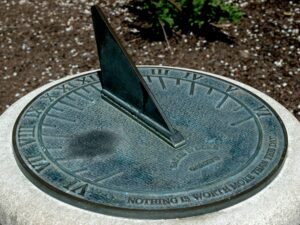
Photo Credit: flickr.com/photos/mricon/8922711
Ha’Azinu: Poetry, Prose and Passing Time
Rabbi Stephen Axinn
Governor Mario Cuomo of New York once quipped that “we campaign in poetry but govern in prose.” However, for Moses, that adage worked in reverse. How so? When he campaigned with God to allow him to cross over the Jordan with B’nai Israel, he resorted to straight-forward prose: “I pleaded with the Lord at that time saying ‘Oh Lord God, You who have let Your servant see the first works of Your greatness and Your mighty hand, You whose powerful deeds no god can equal, let me, I pray, cross over and see the good land on the other side of the Jordan, that good hill country and Lebanon.” (Deut. 3:23-25).
But God rebuked Moses saying “Enough, never speak to Me about this matter again”, (Deut. 23:26), Moses then returned to his role as “Rabbenu” at which point he governed in exquisite poetry, marked by his concluding oration known as “Ha’azinu.” The message of Ha’azinu transcends time and space. As Dr. Aviva Gottlieb Zornberg puts it “Moses is no longer speaking on behalf of God, but is, instead, in his own voice, conscious of his own imminent death… He speaks now to the people and on their behalf with a passion into which his own desire has metaphorically ‘crossed over’.”1
There is an inscription on an ancient sundial that reads “each one wounds; the last one kills.” Once we arrive at the age when we really begin to appreciate the truth in that message, if we are not careful, we can then turn to despair since it finally hits us that our life is a depleting resource. Yet, this is also the moment when we should learn how to treasure the gift of each new day as a precious jewel not to be wasted. Since the past is irretrievable–and as that grim sundial reminds us, the next hour could be our last–the only rational response is for us to grasp each new day we are given as if it is the only day we have.
This is the message of Ha’azinu. We see Moses standing before the people he has led for 40 years, who will now enter the Land of Promise without him as their leader. He has reached the end of his life and he knows it. He chooses to speak to them in song. He uses this song–this poignant moment–to teach them, and us, the essential truth: That God is the eternal foundation on which all else depends. Although there will be difficult times to come and God will seem to be distant, and even harsh, God will always relent and renew His covenant with us, provided we maintain our love and our faith in God. Moses uses the final moments of his own life to teach us how to reach that Land of Promise that would be denied to him. His message is as true today as it was back then in the wilderness.
Perhaps that is why we often read Ha’azinu on the Shabbat in between Yom Kippur and Sukkot. This is a time when, like Moses, it is incumbent upon us to reflect on the course of our own lives. Moses’ life began in a bulrush in the Nile, after which he was passed back and forth between his real mother and a surrogate Egyptian princess mother. Raised as a prince, pursued as a fugitive, nominated as a prophet par excellence by God. and now as an old man about to be gathered to his kin, Moses knows what it means to pray, as we do on Yom Kippur: “Do not cast me away in my old age when my strength fails me; do not forsake me”.
Once we realize that we have survived the mini death of Yom Kippur, we stand before Moses as he delivers this final song to us. We are–or should be–so grateful to have averted, at least for now, the stern decree. But, in just a few days we are commanded to leave our homes and take up residence in a shaky sukkah, exposed to the God-given elements. This change of venue reminds us that our lives always depend on the continued love of God. No matter how comfortable our lives might be the rest of the year, Sukkot reminds us that we are always exposed to forces beyond our control. Ha’azinu occupies this liminal space between that small taste of death on Yom Kippur and the thrill of our continuing precarious existence that is Sukkot. In this scary, liminal space, Ha’azinu teaches that we are never alone, nor have we been abandoned. On the contrary; we have lived, we have sown and now we are allowed to reap our harvest from God’s storehouse.
In the Sh’ma Koleynu prayer on Yom Kippur we acknowledge our utter dependence on God and we beg God to hear us and not to forsake us, especially in our old age. It is a precious moment to reflect on the gift of life itself. So, following Moses’ instruction and his example, let us fully embrace our age and rejoice in the blessings we have already received and in this new day that we have been given. May we all be blessed to be able to look forward with confidence and with serenity, strong in the belief that even when our strength fails us, we will not be cast aside in old age. As the psalmist says: Zeh Hayom asah Ha’shem, nagilah v’nism’cha bo–“This is the day that the Lord has made, be glad and rejoice in it.”
[1] Aviva Zornberg Gottlieb, Moses, A Human Life, (Yale U. Press 2016)









0 Comments